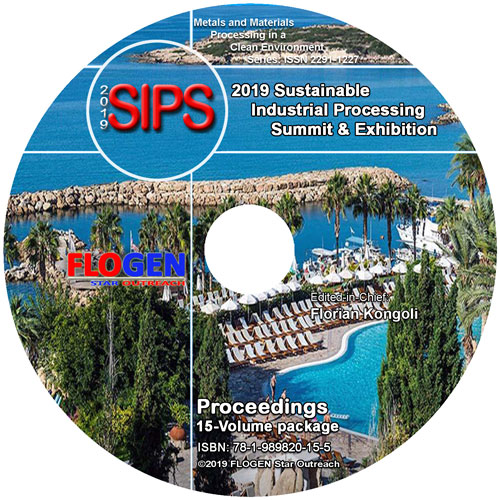2019-Sustainable Industrial Processing Summit
SIPS2019 Volume 9: Tressaud Intl. Symp. / Solid State Chemistry for Applications and Sustainable Development
| Editors: | F. Kongoli, M.A. Alario Franco, J. Etourneau, S. Kalogirou, F.D.S. Marquis, R. Martins, K. Poeppelmeier, B. Raveau, Y. Shimakawa, M. Takano |
| Publisher: | Flogen Star OUTREACH |
| Publication date: | 20 December 2019 |
| Pages: | 130 pages |
| ISBN: | 978-1-989820-08-7 |
| ISSN: | 2291-1227 (Metals and Materials Processing in a Clean Environment Series) |

CD shopping page
Computationally-Enabled Routes to New Inorganic Materials
Matthew Jonathan Rosseinsky1;1UNIVERSITY OF LIVERPOOL, Liverpool, United Kingdom;
Type of Paper: Regular
Id Paper: 361
Topic: 52
Abstract:
The knowledge we have developed through the synthesis and experimental study of extended solids allows us to efficiently identify new materials. In many cases, this knowledge includes scientifically interesting or technically important changes in properties. An example is the chemical control of the transparent conducting behaviour of correlated metals (1), evaluated as epitaxial films through optical and transport data. The selection of d0 cations to stabilise oxygen-oxygen bond formation upon deep oxidation of lithium ion cathodes is another example (2). Here, computation provides underpinning guidance in the selection of experimental targets.
The large potential range of accessible compositions and structures, however, challenges our present capabilities. As part of the current interest in exploring computationally-enabled routes to new materials, we are developing computational tools for the identification of stable new compositions. We have recently (3) been able to predict ab initio the regions of composition space that afford new materials. We then subsequently isolate those materials experimentally, using the computation of the energies of probe structures identified by new crystal structure prediction methods (4) to explore the space. The presentation will discuss the potential offered by informatics approaches often referred to as machine learning in such work.
Keywords:
Advances in the synthesis routes; Design of materials for sustainable energy production;References:
(1) J.L. Stoner et al., Advanced Functional Materials 29, 1808609, 2019(2) Z. Taylor et al., J. Am. Chem. Soc. 141, 7333, 2019
(3) C. Collins et al., Nature 546, 280-284, 2017
(4) C. Collins et al., Faraday Discussions 211, 117, 2018